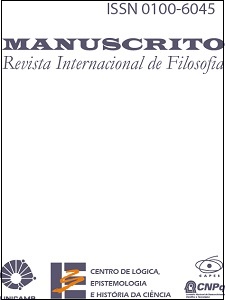Resumo
In this paper a concept of pain is introduced that regards pain as a formal entity that can be realized in various material ways, similarly to the concept of justice. Pain utterances have rather the character of evaluative judgments and not of propositional descriptions. They aren’t therefore true or false, but adequate or inadequate, correct or wrong, according to the circumstances and the context, in which they are made. Because pain is constituted by the interplay of individual and public attitudes also inside a given cultural context we are always capable of extending our concept of pain by integrating other cultural attitudes towards pain and also capable of giving arguments that shall convince the members of an other culture to accept our ideas about pain.Referências
BEECHER H.K. Measurement of Subjective Responses. Oxford: Oxford
University Press, 1959.
BERGDOLDT, K., ENGELHARDT, D. (eds.). Schmerz in Wissenschaft,
Kunst und Literatur. Hürtgenwald: Pressler, 2000.
BERGER, P.L., LUCKMANN Th. Die gesellschaftliche Konstruktion der Wirklichkeit, Frankfurt: Fischer, 1970.
BRÅTEN, S. “Infant Learning by Altercentric Participation”. In: S. BRÅTEN (ed.). (1998), pp. 105-124.
——— (ed.). Intersubjective Communication and Emotion in Early Ontogeny. Cambridge: Cambridge University Press, 1998.
———. “Im Gegensatz zu Piagets Theorie. Spracherwerb und Sprachentwicklung von einem alterzentrischen Standpunkt betrachtet”.
In: N. Psarros, P. Stekeler-Weithofer and G. Vobruda (eds.) (2003),
pp. 61-88.
CHURCHLAND, P.M. “Eliminative Materialism and the Propositional Attitudes”. Journal of Philosophy, 78, pp- 67-90, 1981.
FOUCAULT, M. Discipline and Punishment. London: Penguin, 1991.
HARDCASTLE, V.G. The Myth of Pain. Cambridge/London: MIT Press,
KANT, I. Die Metaphysik der Sitten. Werkausgabe, Band VIII. Frankfurt:
Suhrkamp, 1980.
LEWIS, D. Convention: A Philosophical Study. Oxford: Blackwell, 2002.
MELZACK, R. The Puzzle of Pain. New York: Basic Books, 1973.
PSARROS, N., STEKELER-WEITHOFER, P. and VOBRUBA, G. (eds.). Die Entwicklung sozialer Wirklichkeit. Weilerswist: Velbrück, 2003.
ROELCKE, V., KNIPPER, M. “Schmerzwahrnehmung und Schmerzverhalten: Theoretische Ansätze aus der Ethnomedizin”. In: K.
Bergdoldt and D. Engelhardt (eds.). Hürtgenwald: Guido Pressler, pp. 219-229, 2000.
SCHILDKNECHT, Ch. “Anschauungen ohne Begriffe? Zur Nichtbegrifflichkeitsthese von Erfahrung”. Deutsche Zeitschrift f. Philosophie, 51, pp. 459-475, 2003.
SCHÜTZ, A. Der sinnliche Aufbau der sozialen Welt. Repr. of the 1932
edition. Frankfurt: Suhrkamp, 1974.
SINGER, P. Practical Ethics. Cambridge: Cambridge University Press, 1993.
SMITH, B., ROSSE, C. “The Role of Foundational Relations in the Alignment of Biomedical Ontologies”, forthcoming.
STERNBACH, R.A., TURSKY, B. “Ethnic differences among housewives
in psychophysical and skin potential responses to electrical shock”. Psychophysiology, 1, pp. 241-246, 1965.
von WRIGHT, G.H. Varieties of Goodness. London: Routledge & Kegan,
WITTGENSTEIN, L. Philosophical Investigations. Transl. by G.E. Anscombe. Oxford: Blackwell, 2002.
ZBOROWSKI, M. “Cultural Components in Responses to Pain”. Journal
of Social Issues, 8, pp. 16-30, 1952.

